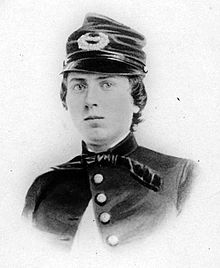Alonzo Cushing
| Alonzo H. Cushing | |
|---|---|

Alonzo Cushing
|
|
| Born |
January 19, 1841 Delafield, Wisconsin |
| Died | July 3, 1863 (aged 22) Cemetery Ridge, near Gettysburg, Pennsylvania |
| Buried at | West Point Cemetery, West Point, New York |
| Allegiance | United States of America |
| Service/branch |
United States Army Union Army |
| Years of service | 1861–1863 |
| Rank |
|
| Commands held | 4th U.S. Light Artillery, Battery A |
| Battles/wars | |
| Awards | Medal of Honor |
| Relations | William B. Cushing (brother), Howard B. Cushing (brother) |
Alonzo Hersford Cushing (January 19, 1841 – July 3, 1863) was an artillery officer in the Union Army during the American Civil War. He died at the Battle of Gettysburg while defending the Union position on Cemetery Ridge against Pickett's Charge. Action was undertaken in 2013, 150 years after Cushing's death, to award him the Medal of Honor. The nomination was approved by the United States Congress, and was sent for review by the Defense Department and the President.
On August 26, 2014, the White House announced he would be posthumously awarded the Medal of Honor. President Obama awarded him the medal on November 6, 2014, in a White House ceremony attended by Cushing's distant cousins, Frederic Stevens Sater and Frederic Cushing Stevens III, and their families, although his closest relation was Helen Bird Loring Ensign, a first cousin twice removed. Cushing left no direct descendants.
Cushing was born in what is now the city of Delafield, Wisconsin and raised in Fredonia, New York. His younger brother was future Union Navy officer Lt. William B. Cushing. They were the youngest of four brothers who eventually served in the Union forces (Their brother Howard was also killed while fighting the Chiricahua in 1871).
Cushing graduated from the United States Military Academy in the class of June 1861, and received commissions as second and first lieutenant on the same day. He was brevetted major following the Battle of Chancellorsville. Cushing commanded Battery A, 4th U.S. Artillery at Gettysburg, and was hailed by contemporaries as heroic in his actions on the third day of the battle. He was wounded three times. First, a shell fragment went straight through his shoulder. He was then grievously wounded by a second shell fragment, which tore into his abdomen and groin. This wound exposed his intestines, which he held in place with his hand as he continued to command his battery. After these injuries, a higher-ranking officer said, "Cushing, go to the rear." Cushing, due to the limited number of men left, refused to fall back. The severity of his wounds left him unable to yell his orders above the sounds of battle. Thus, he was held aloft by his 1st Sergeant Frederick Füger, who faithfully passed on Cushing's commands. Cushing was killed when a bullet entered his mouth and exited through the back of his skull. He died on the field at the height of the assault. He was 22 years old.
...
Wikipedia
